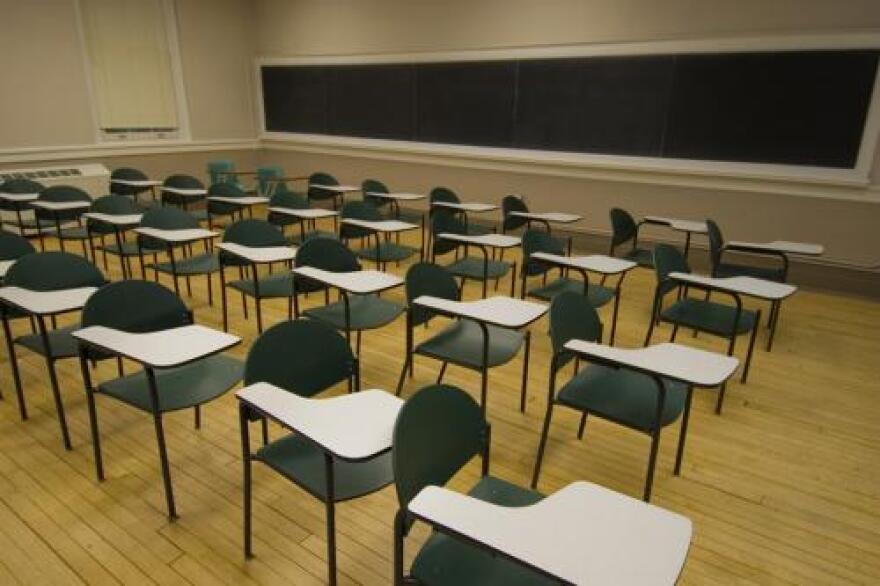Students across the state are more than halfway through fall semester, tackling traditional subjects like math, science and foreign languages. But some classrooms in Central Illinois are suffering from a lack of permanent teachers in those areas. Administrators in secondary and higher education say the lack of qualified instructors is symptomatic of broader issues. Alex Rusciano reports on what appears to be a shrinking pool of qualified educators.
Students at at Illinois Valley Central High School in Chillicothe are participating in the school’s Spanish 200 course:
This sounds like your typical high school Spanish class.
But Rachel Perry is the standing substitute teacher.
She has a minor degree in Spanish and has been teaching the class since the beginning of the school year. When the previous Spanish teacher resigned over the summer, the district posted the job opening:
“Unfortunately, we didn't get a single certified Spanish teacher to apply.”
That’s IVC Schools Superintendent Chad Allison. He says time is running out to find a permanent, qualified Spanish teacher:
"If that doesn’t happen and we can't find someone who’s certified, we will be at the sub route again, to which we’ll be looking at a different sub because this person can’t do more than 90 days. And so then we’re almost a doubly whammy, where we have to find another sub who now has less experience than the person we have in there right now.”
Allison says the district settled on a sub after ruling out other possibilities, like whether to eliminate the Spanish class altogether. He says they also considered paying to use an online ‘Virtual School’ to teach the language. And other school districts are using programs like Rosetta Stone to fulfill some foreign language teacher gaps.
But that raises questions about the number of qualified teacher available. Superintendent Chad Allison:
“So we look at the universities. Well in the universities, from what we’re hearing across the state, at the very basic level, they’re not getting the same size of candidate pools as they have in the past.”
Public and private schools across the country report data on specific teacher prep programs through the Higher Education Act.
In 2011, Illinois teacher-prep programs saw a slight drop in student enrollment, about a quarter-of-a-percent. In 2012, the overall drop was four-percent. The latest statewide report shows an enrollment decline of nearly 20-percent year to year. And at least one state university had a 75-percent drop in enrollment last year.
Beth Derry is Superintendent for the Peoria County Regional office of Education. She says there’s a competition between area districts for higher level math, science and foreign language teachers:
“I know several schools are going after that novice teacher, that teacher that’s in the college that wants to student teach in this area. They’re even going after them so that they know that, hey why don’t you stick around when you’re done with your college degree? We would love to have you.”
That's something the Chillicothe school district is looking to do next semester. Both Derry and Superintendent Allison say one reason for the lack of teachers is that state testing standards are too high. Five years ago the state raised the minimum score required to pass the Test For Academic Proficiency. College students in teacher-prep programs are required to pass that exam before they are certified to teach.
Illinois State Superintendent Chris Koch says the scores needed to go up because the exam wasn’t rigorous enough and nearly everyone was passing it. But Koch says the state uses more techniques beyond just testing to boost the confidence and proficiency of teachers-in-training:
“We’re moving now to a performance assessment where teachers are actually going to be videotaped delivering lessons, those are evaluated, so that we know that when you go into the classroom, you’re ready to do the job.”
Koch says the state also needs to do more to help newly certified teachers. To that end, he says the state board is boosting peer observation in the classroom to help improve the way new teachers teach and students learn.
Some education officials also say the field may be less appealing because of the culture of standardized testing for teachers in training and their students in the classroom.
Dean Cantu chairs the Teacher Education Department at Bradley University. He says the teaching profession is still viewed in high regard. But Cantu says that new statewide evaluations for students and changing guidelines for teachers can create the perception of a more complex environment in the classroom:
“We’re changing and it’s evolving and so perhaps as a result individuals will look at those different variables and perhaps characterize teaching the profession in a different light based on perhaps the response or the roll out of those new assessments.”
Cantu also says the lack of qualified educators in the state matches a nationwide trend. More teachers are retiring at the same time more students are enrolling.
I’m Alex Rusciano.

